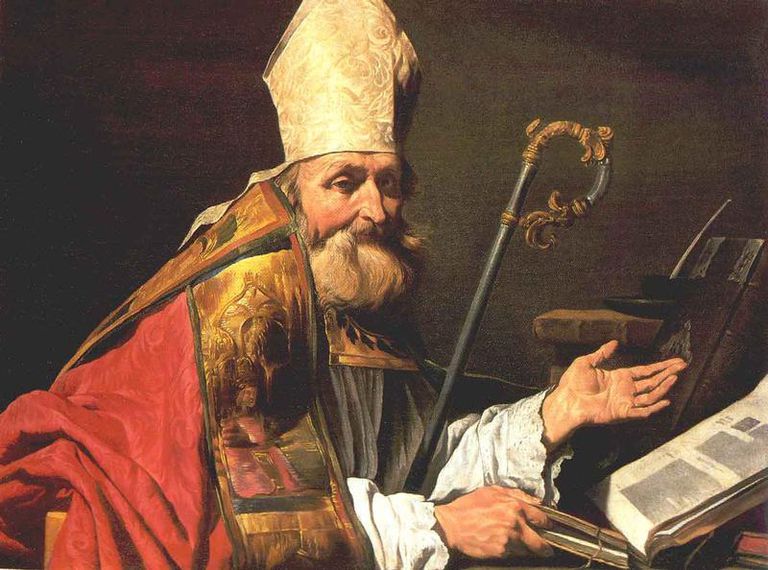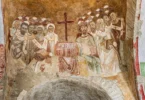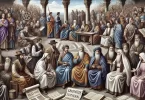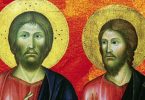“Jews are the most worthless of all men. They are lecherous, greedy, rapacious. They are perfidious murderers of Christ. They worship the Devil. Their religion is sickness. The Jews are the odious assassins of Christ and for killing God there is no expedition possible, no indulgence of pardon. Christians can never cease vengeance, and the Jews must live in servitude forever. God always hated the Jews. It is essential that all Christians hate them.”
St. Ambrose of Milan
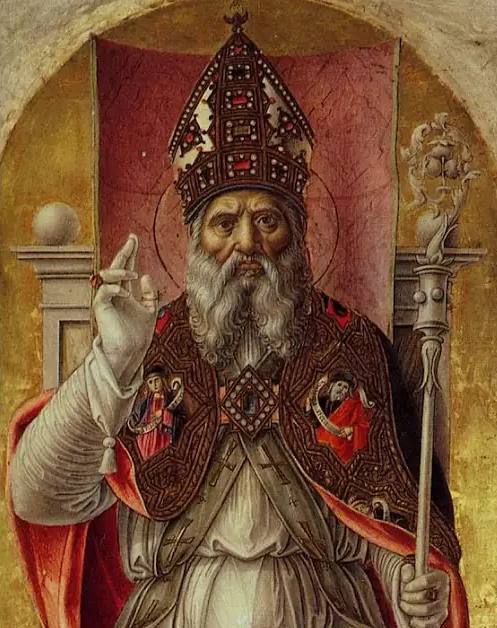
Ambrose was the second son of Ambrosius, the imperial viceroy of Gaul and part of an ancient Roman family who numbered several Christian martyrs among their ancestors. Though Ambrose was born at Trier, his father died not long after and he was brought to Rome to be raised. Throughout his childhood, the future saint would be acquainted with many members of the clergy and would regularly visit with his sister Marcellina, who was a nun.
Bishop, Philosopher, Theologian, Religious Leader, Saint, Teacher, Writer.
Ordained: c. 340-12-07
Died: 397-04-04
Born of a noble Roman family in Gaul around the year 340, Ambrose studied in Rome and served the imperial government at Sirmium. In 374, elected bishop of Milan, and ordained on this date. Saint Ambrose died April 4, 397. The Pope proclaimed Saint Ambrose a Doctor of the Church in 1298; he is honored as the patron saint of beekeepers and candle makers, because of the honeyed words of his preaching.
Ambrose’s civil experience as governor allowed him the skill of knowing how “to talk to power.” When the Emperor Theodosius had 7,000 Thessalonians slaughtered over the assassination of their governor, he excommunicated him for his horrendous crime – and made it stick, bringing Theodosius to repentance.
Ambrose played an important role in the struggle against the Arian heresy, standing against them at a synod in Aquileia and refusing to turn over a church in Milan for their use. When a pagan faction of the senate appealed to Emperor Valentinian II for a return to regular pagan observances, Ambrose responded in a letter to the emperor with sound arguments that effectively shut the pagans down.
Ambrose frequently helped the poor, secured pardons for the condemned, and denounced social injustices in his sermons. He was always happy to educate people interested in becoming baptized. He frequently criticized public figures, and he advocated chastity to such an extent that parents of marriageable young women hesitated to let their daughters attend his sermons for fear they’d take the veil. Ambrose was enormously popular as bishop and on the occasions when he butted heads with imperial authority, it was this popularity that kept him from suffering unduly in consequence.
In 383, Ambrose was engaged to negotiate with Maximus, who had usurped power in Gaul and was preparing to invade Italy. The bishop was successful in dissuading Maximus from marching south. When Ambrose was asked to negotiate again three years later, his advice to his superiors was ignored. Maximus invaded Italy and conquered Milan. Ambrose stayed in the city and helped the populace. Several years later, when Valentinian was overthrown by Eugenius, Ambrose fled the city until Theodosius (the Eastern Roman emperor) ousted Eugenius and reunified the empire. Though he did not support Eugenius himself, Ambrose petitioned the emperor for pardons for those who had.
mbrose was an avid student of philosophy and he incorporated what he learned into his own particular brand of Christian theology. One of the most notable ideas he expressed was of the Christian Church building its foundation on the ruins of the declining Roman Empire, and of the role of Christian emperors as dutiful servants of the church — making them, therefore, subject to the influence of church leaders. This idea would have a powerful impact on the development of medieval Christian theology and the administrative policies of the medieval Christian Church.
Saint Ambrose of Milan was known for being a Doctor of the Church. Ambrose was the first to formulate ideas about church-state relations, which would become the prevalent medieval Christian viewpoint on the matter. A bishop, teacher, writer, and composer, St. Ambrose is also famous for having baptized St. Augustine.
Sources:
https://www.thoughtco.com/saint-ambrose-of-milan-1788348

